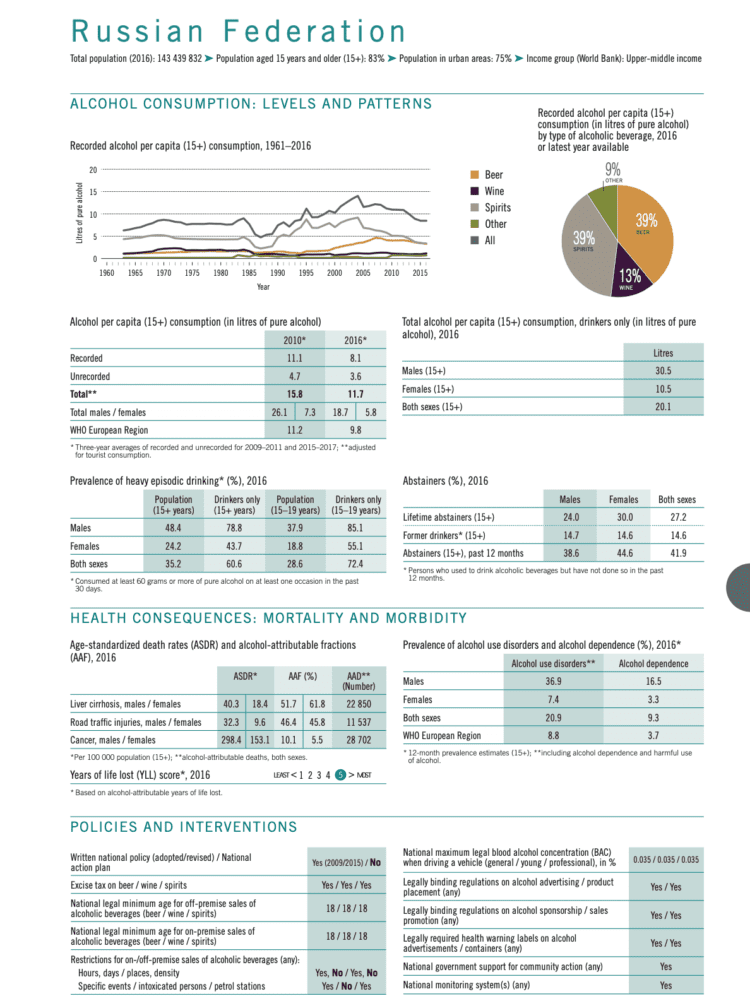Russia: Alcohol Policy Reforms Yield Results
Alcohol policy reforms in Russia yield positive results for the country by reducing alcohol consumption and related harm.
Russia used to hold the title for being one of the countries in the world with the highest alcohol consumption. Now the rank has fallen to 14th – on par with Germany and France. Twelve years ago Russian per capita alcohol use was about 15 litres per year. Now it has declined to about 10 litres. What’s even better is that the consumption of strong alcohol, such as vodka, has decreased by 31%.
The World Health Organization (WHO) has hailed Russia as a success story for using alcohol policy solutions effectively to reduce population-level alcohol consumption and related harm. According to the WHO, total per capita alcohol consumption has been declining since 2003 and dropped by 43% until 2016 – with a 40% decline in recorded consumption and a 48% decline in unrecorded consumption.
The reduced overall alcohol use has led to a variety of positive results for the country.
- The drop in alcohol use has led to a drop in all-cause mortality by 39% in men and 36% in women between 2003 and 2018, with the sharpest decline in causes of death linked to alcohol consumption.
- This helped average life expectancy in the Russian Federation reach a historic high in 2018, at almost 68 years for men and 78 years for women.
- Over the past 12 years, alcohol poisoning deaths and suicides in which alcohol played a part both reduced by 30% each.
Russia’s alcohol control policy
Since 2005, the Russian government has implemented sweeping alcohol restrictions to tackle the country’s alcohol problem. These include the following measures:
- Gradually raising excise taxes on alcohol;
- Introducing a minimum unit price policy on vodka as far back as 2003, then increasing the minimum unit price over the years, before expanding this policy to other alcoholic beverages;
- Introducing a real-time tracking system on the production and sale of alcohol;
- Beginning a comprehensive night-time ban (11PM) on off-premises sales of alcohol nationally, with even stricter restrictions on alcohol availability in some regions, as well as strict policies on alcohol-free public space and alcohol marketing.
Russia’s health Ministry is also drafting legislation to raise the legal age for alcohol consumption from 18 to 21 years.
Alcohol harm in Russia
Alcohol harm in Russia is still pervasive, exerting a heavy toll on people, communities and society at large – even though the situation is improving.
Data from the WHO Global Alcohol Status Report 2018 shows that Russia ranked among the leading countries for years of life lost due to alcohol – something that is slowly improving since 2016.
Alcohol use disorder (AUD) among the Russian population is off the charts with more than 20% struggling with an AUD, especially for men where more than one third of Russian men has an AUD.
In Russia, every year more than 28.000 people die from cancer due to alcohol. More than 22.000 people die due to alcohol-induced liver cirrhosis. And more than 11.000 people die because of alcohol-fueled traffic injuries.
Heavy episodic alcohol use, in addition to epidemic levels of AUD and the high per capita alcohol use, is also (still) at alarming rates: more than 60% of adult alcohol users engage in binge alcohol use and more than 70% of 15- to 19-year olds engage in binge alcohol consumption in Russia.
In this context, it is very positive that Russia’s commitment to scientifically proven alcohol policy making is strong and consistent.
Community activism to enforce laws
Russia is tackling issues of illegal alcohol and breaking the night-time sales ban by cracking down on those who break the law. Sober Russia is a group with volunteers who help the police to enforce laws controlling alcohol.
The volunteers conduct mystery shopping to test stores’ compliance with the 11PM alcohol sales ban.
Four years ago, when we started, eight out of 10 stores in Moscow were selling illegal alcohol. Right now, it’s three out of 10,” said Grigoriev, a volunteer of Sober Russia, as per CBC.
Illegal alcohol has been a deadly problem for Russia. In one of the worst cases in recent times, 78 people died in the Siberian city of Irkutsk in 2016 after consuming illegally brewed alcohol.
Moving to alcohol-free lifestyle
The healthy alcohol-free lifestyle is also slowly taking hold in the country.
Increasingly there are initiatives and campaigns to promote the alcohol-free way of life, to support people to quit alcohol use and to encourage people to get treatment and support in overcoming alcohol use disorders. Furthermore, new projects emerge to support children and youth in delaying alcohol use onset.
“We are new Russians. We don’t [consume] alcohol,” said Sysoev and Forsenco, two filmmakers and alcohol prevention activists, as per CBC.

